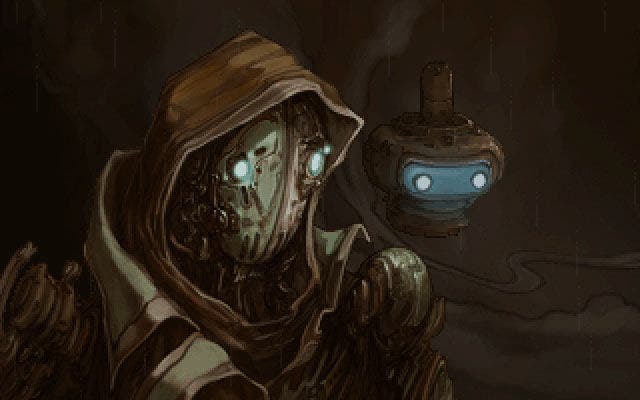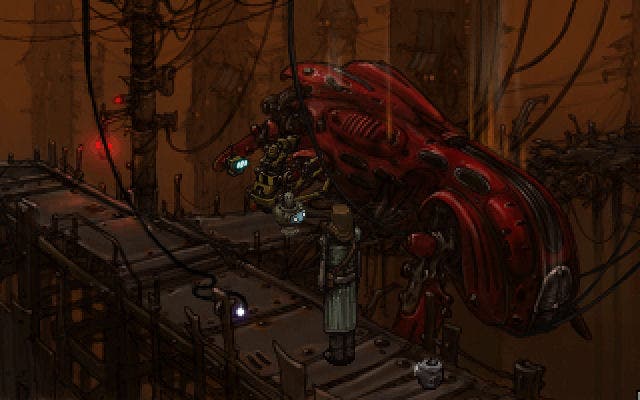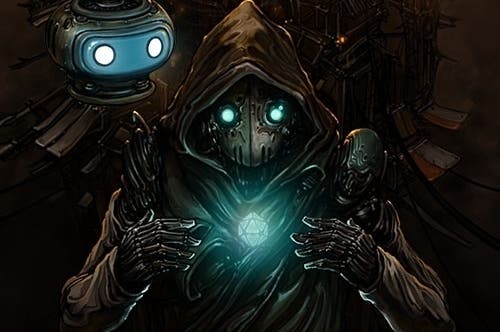Primordia review
Judge droid.
Amnesia is the video game scriptwriter's best friend. Give yourself a protagonist who doesn't know who they are, and you've got a head start on how the story will unfold as they piece together their past.
Horatio Nullbuilt, the robotic hero of point-and-click adventure Primordia, at least has a good excuse for his forgetfulness: he's version five of a lineage of indistinct origin, completely unaware of what his previous iterations got up to. More to the point, he doesn't much care. When we meet him he's quite happy living in the ruins of a crashed spaceship in a war-ravaged wilderness, with only his hovering handyman companion, Crispin Horatiobuilt, for company. Then, out of the blue, a hulking boxy robot with lasers in its arms bursts in, steals their power core and leaves Horatio for dead.
It's here that the adventure begins, and your first order of business is simple: get the back-up generator so Horatio and Crispin can recharge before they wind down forever. Once that's achieved, the goal is to track down that thieving robot and get your power core back. That in turn leads our squabbling pair to the robot city of Metropol where things... well, that's where they get really interesting.

Despite a final act that revels in thorny metaphysical and philosophical questions, Primordia is a simple game with a neat clarity of purpose in its story that is reflected in the game's mechanics. Everything is handled with the mouse buttons - a left click to interact, a right click to examine - and every function you could need is always available from a drop-down control panel that appears when you move the pointer to the top of the screen.
Items can easily be combined in your bottomless inventory or pulled out into the game world where you can try using them on every hotspot and character. There's also a map, which allows you to fast travel to every location in an instant, and a datapad, which automatically stores biographical information about characters, lore and backstory as well as any codes and passwords you learn about on your journey.
The look is pure old-school, with a chunky 16-bit visual style that immediately references at least one obvious influence - Beneath a Steel Sky - along with the classic LucasArts entries in the genre. It's charming, but also somewhat limiting. The animation is often cruder than some of the games Primordia was inspired by. Horatio seems to have only a few frames, which makes him look a bit odd as he walks around, while any of the more extravagant moments - explosions and other action, for example - fizzle weakly rather than delivering the required punch. The game's drab colour palette is also disappointing, painting both desert and city in the same browns and reds, while the game is often very dark.
"As much as Primordia references the past, it has very little interest in mimicking painstaking needle-in-a-haystack chores."

Thankfully, there's very little pixel-hunting in these sometimes murky locations. As much as Primordia references the past in its appearance, it has very little interest in mimicking the sort of painstaking needle-in-a-haystack chores or elaborate, opaque puzzles that once typified the point-and-click genre. Objects are rarely hard to find and are almost always put to logical use. A plasma torch found in the opening scenes remains useful at the very end of the game. A device for transmitting codes to remote objects proves handy more than once. For some of the game's harder puzzles - some of which revolve around such robot-friendly concepts as binary and prime numbers - there's often an alternate solution, either bypassing the puzzle entirely or getting another character to solve it for you.
This flexibility is mirrored in the plot itself, which offers multiple endings based on how you solved various problems, whether you killed or spared certain characters and what choices are made at the end.
It's a pretty good story as well, if a little obvious in its debt to cyberpunk fiction and, in particular, The Matrix. There's richness and depth here, though, with systems and traditions that make sense and have a feel of historical weight behind them - such as the way the robot surnames reveal who created them. Armed with this knowledge, the observant player can join narrative dots that would otherwise go unremarked, just as Horatio's status as "nullbuilt" feeds into his own mysterious origins.
With this robust narrative backing, the way Primordia develops from hokey sci-fi yarn into a genuinely compelling study of conflicting ideologies and the dangers of dogmatic allegiance is truly impressive - as is the way it balances out its heavier twists with a constant and enjoyably irreverent sense of humour. The banter between Horatio and Crispin is wonderfully written and performed with real conviction. Horatio himself is voiced by Logan Cunningham, narrator of the excellent Bastion, which should give you an idea of the quality of the voice work.

Primordia's biggest flaw is how short it feels, though this is admittedly due in part to the growing pains of the point-and-click genre itself. The move away from convoluted and arcane inventory puzzles and the introduction of flexible narrative and a fast travel map all combine to make a game that is incredibly accessible, yet they remove the elements that would previously have given an adventure like Primordia its longevity. As it is, you can fly through the game in the space of an afternoon and only a few of the obstacles will hold you up for any serious amount of time.
It's not so much that the game is short - 2012 proved time and again that a short game can often be a great game - it's rather that it feels like it only scratches the surface of an intriguing world. The city of Metropol boasts only five or six major locations, few of which are larger than three screens, and hints that a bridge to the rest of the city has been damaged only make it more claustrophobic. That promise dangles over the latter half of the game, suggesting that the map will expand at some point, but it never happens.
Primordia is delightful, smart and packed with personality, but it also comes to a close just as you're ready to explore more of its engrossing world. Leaving the player wanting more is no great disaster, of course - and the truncated length makes it tempting to go back and try to earn some of the different endings - but it still feels like a really good game that is only a few drafts away from greatness.









